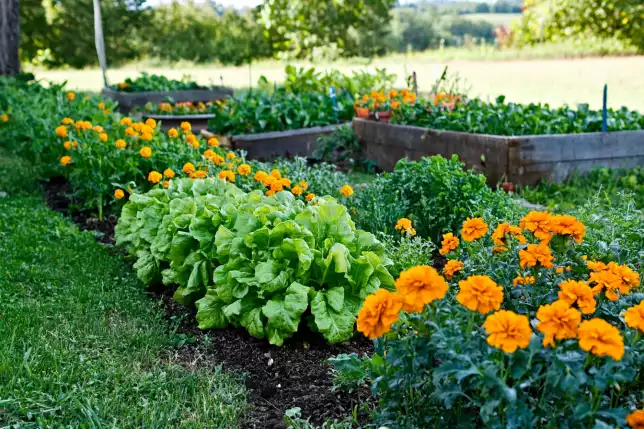The best companion plants for a vegetable garden can make a significant difference in plant health, pest control, and yield. Companion planting is a proven technique that involves pairing plants strategically to naturally repel pests, improve growth, and boost your garden’s productivity. This guide explores how to use companion plants effectively for a thriving vegetable garden.

1. Introduction to Companion Planting
What Is Companion Planting?
Companion planting involves growing certain plants together to benefit each other. This technique can improve soil health, deter pests, attract pollinators, and enhance growth.
Benefits of Companion Planting
- Natural Pest Control: Some plants naturally repel harmful insects, reducing the need for chemical pesticides.
- Improved Yields: Companion plants can boost productivity and support each other’s growth.
- Healthier Plants: This practice promotes a balanced ecosystem, resulting in healthier, stronger crops.
Learn more about how to make your garden thrive here.
2. Best Companion Plants for Popular Vegetables
Companion Plants for Tomatoes
Tomatoes thrive when planted alongside specific herbs and flowers that keep pests at bay.
- Best Plants: Basil, marigolds, and carrots.
- Benefits: Basil repels aphids, while marigolds deter nematodes, making them excellent tomato companions.
Companion Plants for Peppers
Peppers benefit from companion plants that repel pests and improve soil quality.
- Best Plants: Basil, onions, and marigolds.
- Benefits: Basil enhances flavor and repels insects, while onions help keep aphids away from pepper plants.
Companion Plants for Cucumbers
Cucumbers thrive when grown alongside herbs and flowers that encourage pollination and repel pests.
- Best Plants: Dill, nasturtiums, and radishes.
- Benefits: Dill attracts beneficial insects, while nasturtiums repel aphids.
Companion Plants for Beans
Beans fix nitrogen in the soil, benefiting nearby plants.
- Best Plants: Corn, squash, and marigolds.
- Benefits: Corn provides natural support for beans, while squash helps keep soil cool and retains moisture.
Companion Plants for Onions
Onions work well with many vegetables and herbs, thanks to their pest-deterrent properties.
- Best Plants: Carrots, lettuce, and tomatoes.
- Benefits: Carrots improve soil aeration, while tomatoes deter pests that can damage onions.
3. Companion Planting with Herbs and Flowers
Using Herbs as Companion Plants
Herbs can attract beneficial insects and repel harmful ones, making them invaluable in a vegetable garden.
- Best Herbs: Basil, thyme, and rosemary.
- Benefits: Basil repels flies and mosquitoes, while thyme keeps cabbage moths away.
Flowers That Benefit Your Vegetable Garden
Some flowers are perfect for repelling pests and attracting pollinators.
- Best Flowers: Marigolds, nasturtiums, and sunflowers.
- Benefits: Marigolds deter nematodes and beetles, while sunflowers provide shade for more delicate plants like lettuce.

4. Plants That Serve Multiple Purposes
Plants That Deter Pests
Some plants are excellent at repelling pests naturally, making them great companions.
- Best Plants: Garlic, marigolds, and tansy.
- Benefits: Garlic repels aphids and other insects, while marigolds prevent nematodes.
Plants That Attract Pollinators
Pollinators are essential for many crops, and certain plants attract them effectively.
- Best Plants: Lavender, borage, and calendula.
- Benefits: These flowers attract bees and butterflies, which improve pollination rates.
Plants That Provide Shade
Tall plants can offer shade for heat-sensitive crops.
- Best Plants: Corn, sunflowers, and okra.
- Benefits: Corn and sunflowers protect leafy greens from intense sun.
5. Common Companion Planting Mistakes to Avoid
Plants That Don’t Grow Well Together
Not all plants are suitable companions. Some combinations can stunt growth or attract pests.
- Avoid: Beans with onions or garlic, as these can inhibit each other’s growth.
- Avoid: Potatoes with tomatoes, since they share similar diseases.
6. Companion Planting Chart for Quick Reference
Vegetables and Their Best Companions
Here’s a quick-reference chart for pairing popular vegetables with their best companions:
| Vegetable | Best Companion Plants |
|---|---|
| Tomatoes | Basil, marigolds, carrots |
| Peppers | Basil, onions, marigolds |
| Cucumbers | Dill, nasturtiums, radishes |
| Beans | Corn, squash, marigolds |
| Onions | Carrots, lettuce, tomatoes |
For more companion planting tips, visit Martha Stewart’s Guide to Companion Planting.
7. Frequently Asked Questions (FAQs)
Q: How does companion planting improve vegetable yields?
A: Companion planting improves yields by boosting pollination, enhancing soil health, and deterring pests naturally.
Q: What are the best companion plants for controlling pests naturally?
A: Basil, garlic, and marigolds are excellent natural pest repellents.
Q: Can companion planting work in small gardens or raised beds?
A: Yes, companion planting works well in small gardens and raised beds, allowing for better use of space and natural pest control.
8. Conclusion
Create a Thriving Vegetable Garden
Companion planting is an effective way to boost your vegetable garden’s health and yield. By strategically pairing plants, you can naturally deter pests, improve soil, and promote stronger growth.
Start Your Own Companion Planting Garden
Whether you have a small space or a large garden, companion planting can help you create a more productive, healthy, and beautiful vegetable garden.

